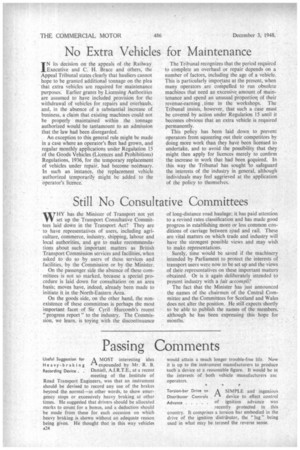No Extra Vehicles for Maintenance
Page 26

If you've noticed an error in this article please click here to report it so we can fix it.
IN its decision on the appeals of the Railway Executive and C. H. Brace and others, the Appeal Tribunal states clearly that hauliers cannot hope to be granted additional tonnage on the plea that extra vehicles are required for maintenance purposes. Earlier grants by Licensing Authorities are assumed to have included provision for the withdrawal of vehicles for repairs and overhauls, and, in the absence of a substantial increase of business, a claim that existing machines could not be properly maintained within the tonnage authorized would be tantamount to an admission that the law had been disregarded.
An exception to this general rule might be made in a case where an operator's fleet had grown, and regular monthly applications under Regulation 15 of the Goods Vehicles (Licences and Prohibitions) Regulations, 1936, for the temporary replacement of vehicles under repair, had become neCessary. In such an instance, the replacement vehicle authorized temporarily might be added to the operator's licence. The Tribunal recognizes that the period required to complete an overhaul or repair depends on a number of factors, including the age of a vehicle. This is particularly imporjant at the present, when many operators are compelled to run obsolete machines that need an excessive amount of maintenance and spend an unusual proportiori of their revenue-earning , time in the workshops. The Tribunal insists, however, that such a case must be covered by action under Regulation 15 until it becomes obvious that an extra vehicle is required permanently.
This policy has been laid down to prevent operators from squeezing out their competitors by doing more work than they have been licensed to undertake, and to avoid the possibility that they might then apply for licences merely to confirm the increase in work that had been icquired. In this way the Tribunal has sought to safeguard the interests of the industry in general, although individuals may feel aggrieved at the application of the policy to themselves.




























































































